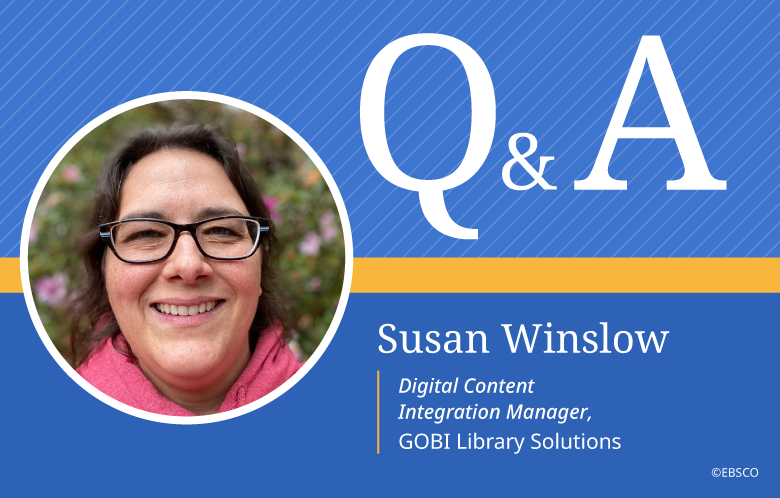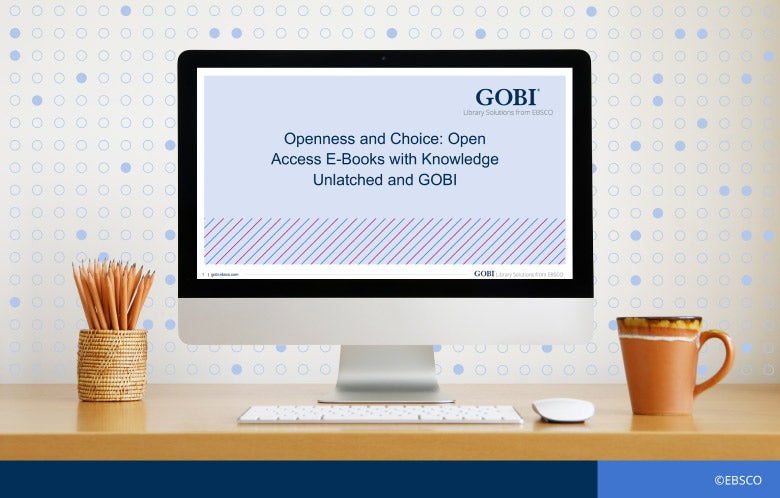In today’s world, the expectation for quick delivery and instant gratification can be seen everywhere we turn. Whether it’s ordering something online, downloading an app, or opening a web page, every second counts. When library users want access to an e-book that is not currently owned by the library, there is an expectation that because it’s an e-book, it should be able to be ordered and that access should be available quickly. That’s why it’s vital that e-books are delivered and made available to the library as soon as possible after they’re ordered.
With the GOBI E-Books in Minutes service, more than 2 million e-books on seven publisher and aggregator platforms are delivered and accessible to users within minutes once ordered through GOBI. With this enhanced workflow, it’s easy for librarians to acquire high-quality, DRM-free e-books and make them available to users quickly and efficiently.
Hear from Susan Winslow, Digital Content Integration Manager at GOBI Library Solutions, as she discusses the GOBI E-Books in Minutes service and how it helps libraries get the e-books they need quickly and efficiently.
Tell me about your background and your role at GOBI.
I have always loved libraries and received my master’s degree in Library and Information Science from Simmons College in 2002. I've been with GOBI for 15 years – I started out as a Customer Service Bibliographer and enjoyed working directly with our librarian partners to support their needs. I then moved over to the GOBI Digital Content Integration team in 2012 and spent most of that time managing the Demand-Driven Acquisition (DDA) & Evidence-Based Acquisition (EBA) services. I was lucky enough to become manager of this excellent team in February of this year and very much enjoy working to support GOBI’s eContent-related products and services.
Why did we develop the E-Books in Minutes service?
With our publisher and aggregator partners, we saw the need our libraries had for more immediate fulfillment of e-book orders. While they may be able to get that immediacy ordering direct, they needed the added support that GOBI brings to their workflow. By ordering their e-books through GOBI, librarians benefit from duplication control, consolidated invoicing, and streamlined customer support. The E-Books in Minutes service takes the relationships we have with our partners to the next level to ensure librarians get the e-books they need quickly.
What are the workflow benefits for librarians?
This service allows the librarians to finalize their acquisitions workflow much more quickly than they were able to do before. Librarians are able to place an order, confirm access and enable discovery within minutes. As a result, they are better able to close out the acquisitions workflow in a fraction of the time. This also gives them more capacity for other acquisitions activities and enables them to provide the best possible service to their faculty and patrons.
Librarians are able to place an order, confirm access and enable discovery within minutes. As a result, they are better able to close out the acquisitions workflow in a fraction of the time.
Librarians are able to place an order, confirm access and enable discovery within minutes. As a result, they are better able to close out the acquisitions workflow in a fraction of the time.
How does it affect the end-user experience?
The E-Books in Minutes service provides nearly immediate e-book access to students and faculty as soon as they may need it. No longer do they have to wait for the traditional order fulfillment period, which was closer to the print order fulfillment model than e-books. This also helps strengthen the relationship between libraries and their students/faculty when they can get the resources they need quickly.
What’s next for the E-Books in Minutes service?
We are expanding our E-books in Minutes partners regularly – we added Wiley in July and are working to expand to other existing partners as they can do so. We also highlight the importance of the E-books in Minutes workflow work with any new partners we onboard and encourage them to support this model out of the gate. We’re always looking for ways to improve our workflows with our publisher and aggregator partners to, in turn, improve workflows for libraries.


